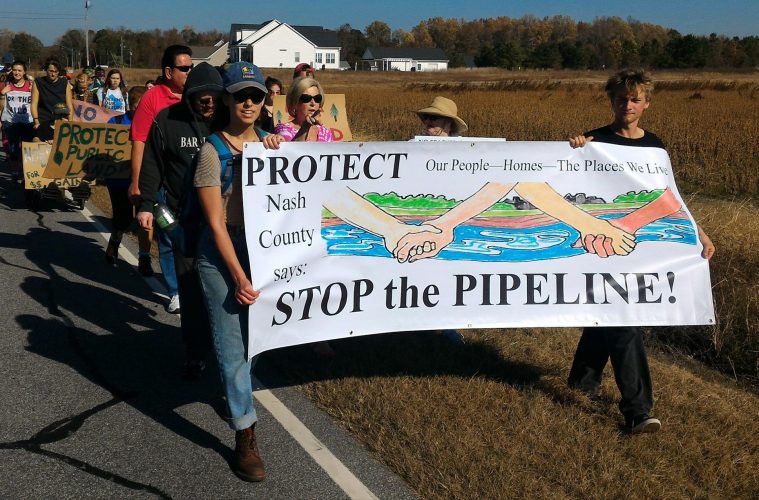Filed under: Action, Development, Environment, Southeast

Dozens of North Carolina residents and supporters from nearby states began a two week long march along the proposed route of the controversial Atlantic Coast Pipeline this past weekend. Starting on March 4, the walkers gathered at the Virginia/North Carolina border and began there 200 mile long journey south where the pipeline ends on Lumbee Indian territory in Pembroke, NC. The walk is organized by the North Carolina Alliance to Protect Our People And The Places We Live
The Atlantic Coast Pipeline, a joint venture of Duke Energy, Dominion Resources, and Southern Company, is a proposed 500 mile, $5 billion pipeline that would bring fracked gas from the Marcellus Shale region in West Virginia, down through Virginia and into North Carolina. If built, the pipeline would destroy over 12,000 acres of land, impact 5 federally listed species, bisect two National Forests, the Appalachian Trail and the Blue Ridge Parkway. In addition, the new gas it will bring to market would create the equivalent emissions to building 20 new coal plants or adding 14 million more cars to the roads.
From the beginning, the ACP has faced stiff opposition from landowners whose land will be stolen through eminent domain, climate activists concerned about building new fossil fuel infrastructure and the expansion of fracking, as well as members of several Native American tribes fearing the destruction of sacred sites by pipeline construction.
A statement released by the newly formed Coalition of Woodland Nations said,
“This pipeline will directly affect the traditional lands of several tribes including the Monacan, Chickahominy, Eastern Chickahominy, Nansemond, Nottoway, Occaneechi, Haliwa-Saponi, Meherrin, Tuscarora, Coharie, and Lumbee.
This pipeline threatens sacred sites of the Monacan Tribe in Virginia and the Tuscarora and Waccamaw peoples of North Carolina. Other undocumented sacred sites are also being threatened. The terminus is in Robeson County NC, home of the Lumbee Tribe and one of the densest populations of American Indians on the east coast.”
The marchers expect over 200 people to participate during their journey along the pipeline route. They hope to raise awareness among residents living along the proposed pipeline and build a strong coalition to ensure it is never built. This walk builds on years of organizing against the ACP, including lawsuits, marches, landowners refusing to let surveyors on their land, and sit-ins.
For information on how to join the walk click here





